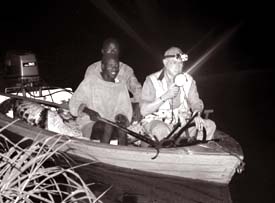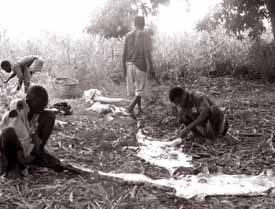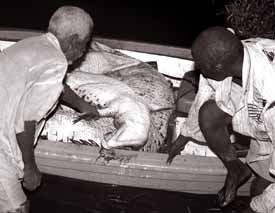|
DAILY NEWS ONLINE |
|
|
|
OTHER EDITIONS |
|
|
|
|
|
|
|
|
|
OTHER LINKS |
|
|
|
|
|
|
 |
Malawi's man-eaters meet their matchTHE ELEPHANT MARSH, Malawi, (Reuters) - Khalid Hassen slows his boat and glides toward his quarry, a headlamp his only guide through the African night.
Suddenly his target is caught in the glare: a four-metre (13 foot) brute of a crocodile crouching in the mud. With split-second timing, Hassen shoulders his rifle and a red flash bursts from the barrel. It is a perfect shot to the head, laying to rest a potentially lethal menace to local villagers terrorised by crocodiles. "That's a good one," said Hassen, whose energy and agility belie his 69 years, as he and his assistant began the task of loading the 400 kg (1,000 lb) croc onto the boat - which at five metres is not much longer than the dead animal. It's all in a night's work for Hassen, a real-life reptile stalker who makes the Australian movie character "Crocodile Dundee" look like a boy scout. Malawi's man-eaters have met their match in Hassen who has bagged more than 17,000 in the past four decades. For poor local people in growing conflict with crocodiles, his nocturnal hunting forays into the fly-infested wetland in southern Malawi known as the Elephant Marsh are most welcome. Malawi, with its tropical climate, fish-rich waters and abundant game is crocodile heaven. The result can be hell for humans as the animals' regular sources of protein come under growing pressure.
Rising numbers of rural dwellers also present tempting opportunities for old crocodiles, which like all animals tend to get lazy with age and prefer to seek easy prey. Stanford Chitsulo, a 26-year-old fisherman from just across the Ruo river in neighbouring Mozambique, was viewed as such. He lost his left leg but not his life. Chitsulo had gone for a morning bath when the animal struck - a frequent occurrence in Malawi and Mozambique, where poor villagers are forced to go to rivers to bathe or wash clothes because they have no running water. At the same hospital where Chitsulo sat listlessly in his wheelchair, two other young men hobbled on crutches, also victims of savaging by crocodiles. Hassen's arrival in the area spread swiftly through the "bush telegraph" and Lettuce Chandilembe, a local fisheries officer asked him to shoot a killer croc which had taken an 11-year-old girl just days before. Attacks increase early in the year when female crocodiles, who are have been guarding their nests, are famished. Crocodiles killed 18 people in the area last year, Chandilembe said. Hassen has heard it all before. He was once called in to hunt a croc that had eaten a young boy. He shot a large one and when it was cut open, the child's head was found inside. Hassen, like many hunters, considers himself a conservationist. In his long career he has not shot during the nesting season and only takes animals that are over five feet long. "You can't kill off your source," he says.
Now a successful Blantyre businessman with interests in construction, Hassen says he can get about $200 a skin although he no longer needs the money. He now has a permit for only 25 crocodiles a year. Under the Convention on International Trade in Endangered Species (CITES), Malawi's annual export quota of the reptile's skins is capped at 200. "They are not letting us remove enough of the animals," Hassan said - adding that poor villagers are suffering the consequences. On this particular night, Hassen wraps up well after midnight after bagging 11 crocodiles - a good night's hunt. The next morning local villagers busily remove the skins, which are salted and preserved for a German buyer. They also smoke the meat to eat and sell at nearby markets. "They have a saying here," Hassen said as chunks of crocodile meat sizzled over an open fire. "The crocs eat the people, so the people eat the crocs." |
||||
|
|
 |








